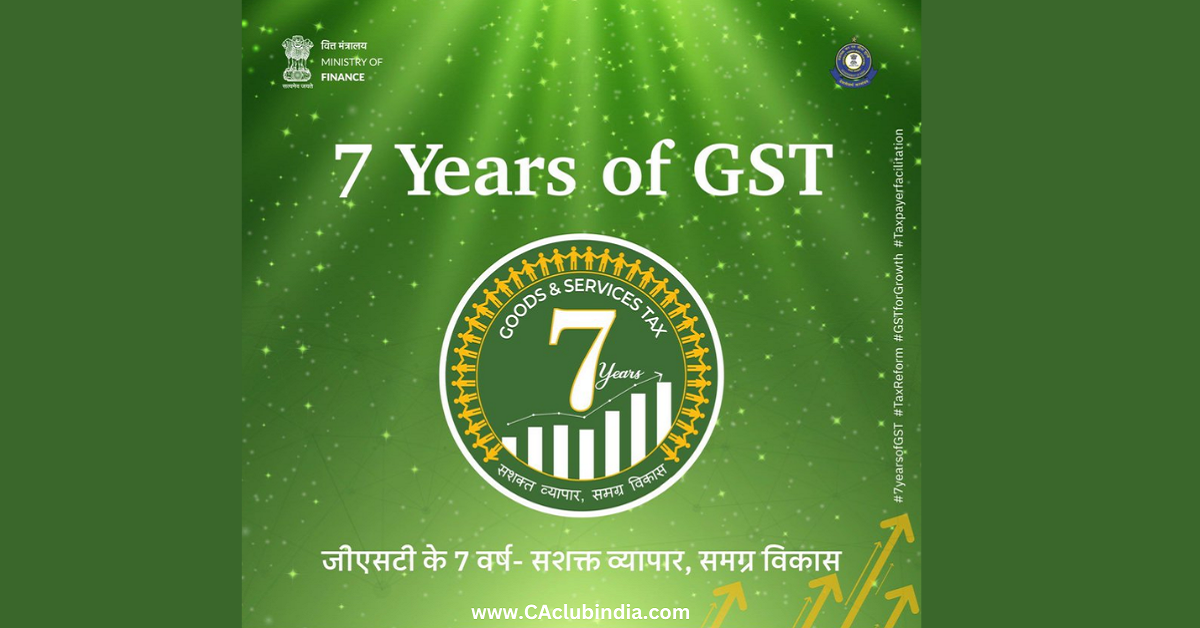The Goods and Services Tax (GST), which marked its 7th anniversary on Monday, has brought significant relief to households through reduced taxes on essential items like household appliances and mobile phones, according to the finance ministry.
Implemented on July 1, 2017, GST replaced around 17 local taxes and cesses, revolutionizing India's tax structure. The theme for the 7th GST Day is "Sashakt Vyapar Samagra Vikas" (Empowered Trade Overall Growth).

"With reduced tax rates on household goods after GST implementation, #7yearsofGST has brought happiness and relief to every home through lower GST on household appliances and mobile phones," the ministry announced in a post on X.
The GST taxpayer base has seen substantial growth, increasing from 1.05 crore in April 2018 to 1.46 crore by April 2024.
“We have witnessed a quantum jump in the taxpayer base along with improved compliance,” stated Central Board of Indirect Taxes and Customs (CBIC) Chairman Sanjay Kumar Agarwal.
Enhanced Ease of Living
The ministry highlighted how GST has eased living costs, providing comparative charts showing pre- and post-GST tax rates on household goods. Items like unpacked wheat, rice, curd, and lassi, previously taxed at 2.5-4 percent, are now tax-free under GST.
Household items, including cosmetics, wrist watches, sanitary plastic ware, doors and windows, furniture, and mattresses, now fall under an 18 percent tax rate, significantly lower than the previous 28 percent.
Additionally, mobile phones, TVs up to 32 inches, refrigerators, washing machines, electrical appliances (excluding air conditioners), geysers, and fans, which were taxed at 31.3 percent before GST, now fall under the 18 percent tax slab.
Simplified Compliance for Small Taxpayers
GST has also reduced the compliance burden for small taxpayers. The GST Council recommended waiving the annual return filing requirement for taxpayers with an aggregate annual turnover of up to ₹2 crore for the fiscal year 2023-24.
The Quarterly Return Filing and Monthly Payment of Taxes (QRMP) scheme has lowered the number of annual returns from 24 to 8 for over 44 lakh small taxpayers. The Invoice Furnishing Facility (IFF) has ensured seamless passage of Input Tax Credit (ITC).
Addressing Challenges
Despite the benefits, challenges such as fake invoices and fraudulent registrations persist. In 2023, the Directorate of GST Intelligence (DGGI) detected tax evasion of over ₹1.98 lakh crore, leading to the arrest of 140 masterminds involved in these fraudulent activities. Significant GST evasion was detected in sectors like online gaming, casinos, insurance, and manpower services.
The establishment of the GST appellate tribunal is expected to streamline and expedite the dispute resolution process, though the principal and state benches are yet to be operationalized.
Institute of Chartered Accountants of India (ICAI) President Ranjeet Kumar Agarwal remarked, “Our efforts in capacity building, including training over 6,800 officials across various government departments, have been pivotal in promoting an efficient and transparent indirect tax regime.”
As GST continues to evolve, its role in simplifying compliance, improving tax buoyancy, and increasing state revenues underscores its importance in India's economic landscape.





 CAclubindia
CAclubindia

